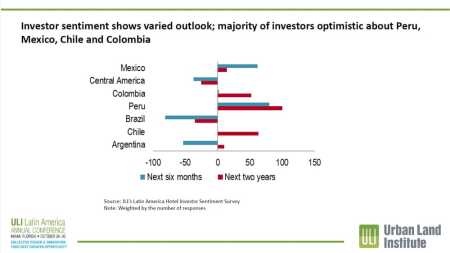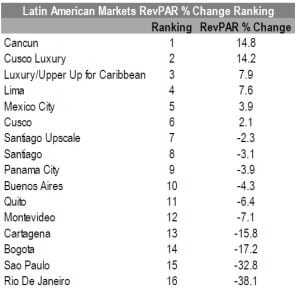The focus of most panelists at ULI’s Latin America Conference, held in late October, was on the stronger markets, including Mexico, Colombia, Peru, and Chile. There also was optimism about a turnaround in Brazil with the upcoming Summer Olympic Games in 2016 and Argentina’s most recent election. In November, the Wall Street Journal reported that investor George Soros had committed to investing $300 million in an expansion of an Argentine company’s hotel properties.
The conference was held in Miami, jointly organized by ULI Mexico and ULI Southeast Florida and the Caribbean. A few of the topics discussed included the following:
What is working. A strong U.S. dollar, coupled with a growing endemic demand for tourism for the region’s growing middle class, has investors optimistic about hotel development. Particularly in Mexico, publicly traded structures like real estate investment trusts (REITs) known as FIBRAs are helping provide liquidity and boost demand for product types. Gutiérrez said, “Business hotels are doing well in secondary markets with a limited-service model, and REITs provide liquidity.” Debt financing is largely unknown given the history of high interest rates. Gutiérrez noted that northern Mexico is producing 3.5 million cars per year. “Industrial is booming,” said Gutierrez. “The working-age population in Mexico is increasing, but you didn’t see apartments in Mexico until recently,” said Gutiérrez. “Either you bought a house or you didn’t have place to live.” The focus on single-family homes has increased sprawl and gridlock, with José Shabot, director general of builder Quiero Casa, saying, “Opportunity remains for more density in places like Mexico City.” Arturo López, chief investment officer of movie theater developer Cinnepolis, said, “There’s a lot of opportunity in mixed use—transforming industrial areas that already have the infrastructure for transport and water.”
Turning cities around. ULI senior fellow Tom Murphy, former mayor of Pittsburgh, and Manny Díaz, former mayor of Miami and a partner at law firm Lydecker Díaz, focused on how Miami has transformed just in the last 15 years, shedding its Miami Vice image. When Díaz was first elected in 2001, he said that unemployment was higher than the city ever experienced during the recent recession. One of the larger developers in southern Florida told Díaz he wouldn’t build a duplex in Miami, but eventually 135 high-rise buildings would be built, tripling the tax base. Díaz also modified the building code to be form based rather than single use, encouraging wider sidewalks and ground-floor retail. Díaz recently came out against a proposal to build a soccer stadium along the Miami’s coastline, saying he thought the land could be better used as open space. “I was brought up in poverty, but the cheapest thing we can all enjoy is nature,” he said. “There has to be a public way.” Citing the importance of public/private partnerships in turning around Pittsburgh after the steel industry collapsed, Murphy talked about the importance of the city itself taking on risk to make the partnership work. “We had thousands of acres of vacant, industrial land,” said Murphy. “The public had to take some of the risk.”
The global sharing economy. Airbnb and VRBO were mentioned by several speakers as being popular in cities like Lima, Peru, where hotels are still underbuilt. Ana Paula Blanco, director of communications for Uber Latin America, talked about how the ride-sharing service is going global, now in 330 cities in 61 countries. Blanco said that the use of credit cards via Uber’s mobile applications reduces the threat of theft for both passengers and drivers. She also said that the generally unmarked cars are less likely to draw unwanted attention, citing a statistic that 60 percent of riders in Colombia are female, suggesting that there is at least a perception that Uber and other services like it are a safer option.
Sustainability and cost savings. For island nations, these topics can take on additional significance. Jim Glasgow Jr. of Five Mile Capital, an alternative-investment manager, said his company has put US$1 million into restoring mangrove swamps in the Cayman Islands, both to add an eco-tourism feature to a high-end Ritz-Carlton and to serve as a buffer against storm surges in an area vulnerable to hurricanes. But in other countries, Glasgow said that his company is not permitted to use solar panels in places like Aruba, where overuse might bankrupt the small local utility. Patrick Freeman, president of the Cisneros Group, said his firm discovered excessive pesticide use near a hotel site in the Dominican Republic as part of an environmental impact study, and has subsequently launched an education campaign to help the local farmers. Freeman also said that import taxes on things like lightbulbs make technologies like LEDs even more financially viable. So even though energy prices are relatively low for now, panelists said that it still makes financial sense to take a longer-term view on energy- and water-saving technologies.






